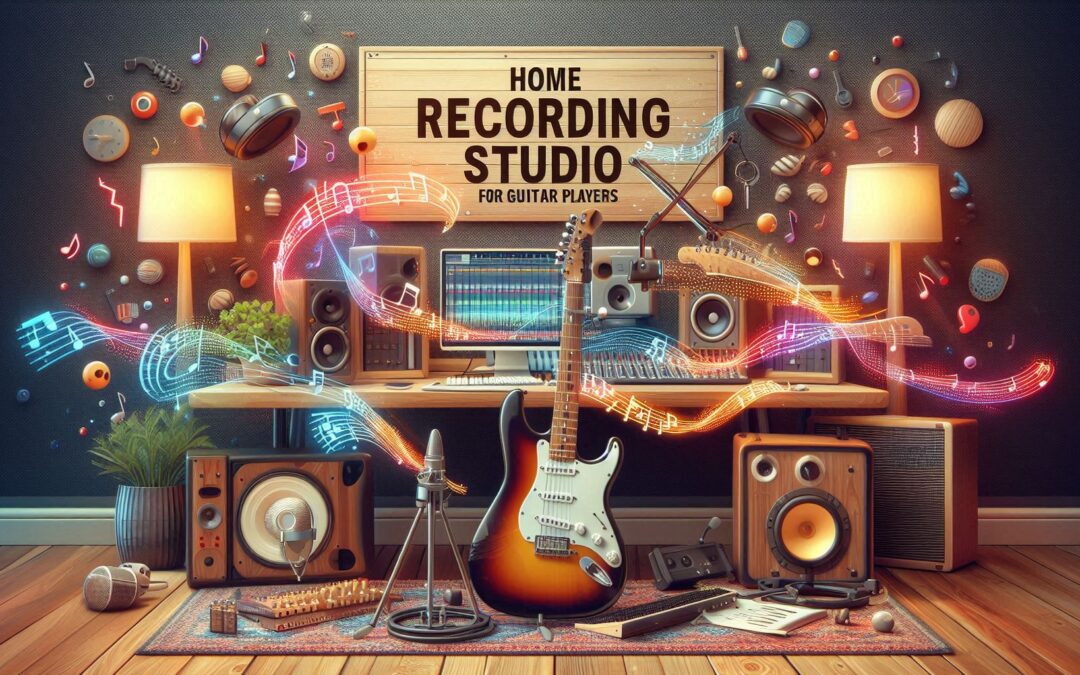The Best DAW for Guitar Players: Create Your Music At Home
Table of Contents
Introduction
Creating music at home has never been more accessible. With the evolution of technology, anyone with a computer and a guitar can produce professional-quality tracks from the comfort of their living room. But to truly unlock your creative potential as a guitarist, you need the right digital audio workstation (DAW). This article will guide you through the best DAWs for guitar players, ensuring your home studio is set up for success.
What is a DAW?
A DAW, or Digital Audio Workstation, is software used for recording, editing, and producing audio files. Think of it as the heart of your home studio, where all the magic happens. DAWs have evolved significantly from their early days of basic midi sequencing to the powerful, multifunctional tools they are today.
Why Guitar Players Need a Specialized DAW
Guitar players have unique needs when it comes to recording music. From the necessity for quality amp simulations to the integration of foot pedal effects, not every DAW caters equally to these requirements. Additionally, dealing with latency and ensuring high-performance playback are critical factors that can make or break your recording experience.
Key Features to Look for in a DAW for Guitar Players
When searching for the perfect DAW as a guitarist, there are several important features to consider:
User-Friendly Interface
A slick, intuitive interface can facilitate your workflow, allowing you to spend more time playing and less time figuring out the software.
High-Quality Amp Simulation
Look for DAWs that offer built-in amp simulators or can easily integrate third-party amp plugins. These simulators emulate the sound of classic amplifiers without needing the physical gear.
Extensive Guitar Effects and Plugins
Having access to a variety of effects – from reverb and delay to distortion and chorus – is a must. This flexibility allows you to experiment and find your unique sound.
Compatibility with Guitar Controllers
Some DAWs support hardware controllers made specifically for guitarists. These can greatly enhance your recording and playing experience by offering hands-free control over your software.
Latency and Performance
Low latency is essential when recording live instruments. You want to hear what you play in real-time without any noticeable delay.
Top DAWs for Guitar Players: An Overview
There are many DAWs out there, but not all are suited to the needs of guitarists. Here are the top five DAWs that cater specifically to guitar players.
1. Ableton Live
Key Features
Ableton Live is renowned for its versatile interface and powerful live performance capabilities. It includes numerous built-in instruments and effects, making it easy to tailor your sound.
Pros and Cons
Pros:
- Excellent for live performances
- User-friendly interface
- Extensive built-in library
Cons:
- Slightly steep learning curve for beginners
- More expensive than some alternatives
Best Use Cases for Guitarists
Ableton Live excels for guitarists who enjoy live performances and experimental looping.
2. Logic Pro X
Key Features
Apple’s Logic Pro X is a favorite among many musicians. It includes a vast array of plugins, including high-quality amp simulators and a plethora of effects tailored for guitarists.
Pros and Cons
Pros:
- Huge selection of plugins and instruments
- Excellent amp simulation
Cons:
- Mac only
- Can be overwhelming for beginners
Best Use Cases for Guitarists
Logic Pro X is ideal for those looking for an extensive built-in library and high-quality, detailed production.
3. Cubase
Key Features
Cubase by Steinberg offers powerful tools for audio and MIDI recording, editing, and mixing. It’s loved for its comprehensive feature set and sound quality.
Pros and Cons
Pros:
- Great sound quality
- Powerful MIDI editor
Cons:
- Slightly complicated interface
- Expensive
Best Use Cases for Guitarists
Cubase is perfect for guitarists who want top-notch audio and MIDI capabilities.
4. Pro Tools
Key Features
Pro Tools is a standard in the music industry and is well known for its impeccable audio editing capabilities. It supports a wide range of plugins and hardware.
Pros and Cons
Pros:
- Superior audio editing tools
- Widely used in the industry
Cons:
- High cost
- Requires a powerful computer
Best Use Cases for Guitarists
Pro Tools suits guitarists looking for professional-grade audio editing and mixing.
5. Studio One
Key Features
Studio One by PreSonus is gaining popularity due to its user-friendly design and workflow. It offers excellent drag-and-drop functionality and a solid range of built-in effects.
Pros and Cons
Pros:
- Intuitive interface
- Good range of built-in effects
Cons:
- Lacks some advanced features of other DAWs
- Still growing plugin library
Best Use Cases for Guitarists
Studio One is great for beginners due to its ease of use and intuitive design.
Visit my sample works in Youtube:
Comparison of Top DAWs
To help you choose, here’s a side-by-side comparison of the features:
| DAW | Main Strengths | Price Range | Best For |
|---|---|---|---|
| Ableton Live | Live performance, looping | $$$ | Live performers, experimental |
| Logic Pro X | Plugin library, amp simulators | $$ | Detailed production, Mac users |
| Cubase | Audio/MIDI quality | $$$$ | Professional production |
| Pro Tools | Professional editing | $$$$ | Industry-standard use |
| Studio One | Ease of use, drag and drop | $$ | Beginners, intuitive workflow |
How to Choose the Best DAW for Your Needs
Determine Your Budget
Decide how much you are willing to invest in your DAW. Prices vary widely, so knowing your budget will narrow down your options.
Evaluate Your Skill Level
Some DAWs are more beginner-friendly than others. Choose one that matches your skill level to avoid getting overwhelmed.
Consider Your Music Style
Different DAWs are better suited to different styles of music. Think about what you will be recording and choose accordingly.
Setting Up Your Home Studio for Guitar Recording
Essential Gear
Besides your DAW, you’ll need a good audio interface, a quality microphone, and decent monitors or headphones.
Acoustic Treatment
To get the best sound, investing in some basic acoustic treatment is worthwhile. This can range from foam panels to bass traps.
Recording Tips
Experiment with mic placement and settings on your DAW. Practice makes perfect, so don’t be afraid to try new techniques.
Tips for Getting the Most Out of Your DAW
Customizing Your Interface
Tailor your workspace to suit your needs. Most DAWs allow you to customize the layout, so make it as user-friendly as possible.
Using Shortcuts
Learning keyboard shortcuts can significantly speed up your workflow. Spend some time getting to know them.
Leveraging Tutorials and Communities
Take advantage of online tutorials and forums. There’s a wealth of knowledge out there that can help you solve problems and learn new techniques.
Conclusion
Choosing the best DAW as a guitar player is crucial to unleashing your creativity at home. Consider your needs, skill level, and budget, then dive into creating amazing music. The right DAW will not only enhance your recordings but also make the process more enjoyable. Happy recording!
FAQs
1. What is the easiest DAW for beginners?
- Studio One is often recommended for beginners due to its user-friendly interface and intuitive drag-and-drop functionality.
2. Can I use a free DAW for guitar recording?
- Yes, there are free DAWs available like GarageBand and Audacity, though they may not offer as many features as paid options.
3. How much should I spend on a DAW?
- It depends on your needs and budget. Entry-level DAWs can cost around $100, while professional-grade software can go up to $600 or more.
4. Do I need additional plugins for guitar recording?
- While many DAWs come with essential plugins, dedicated guitar effects plugins can significantly enhance your recordings and give you more creative control.
5. How can I improve my DAW’s performance?
- Ensure your computer meets the DAW’s system requirements, keep your software updated, and consider increasing your RAM if performance issues persist.


